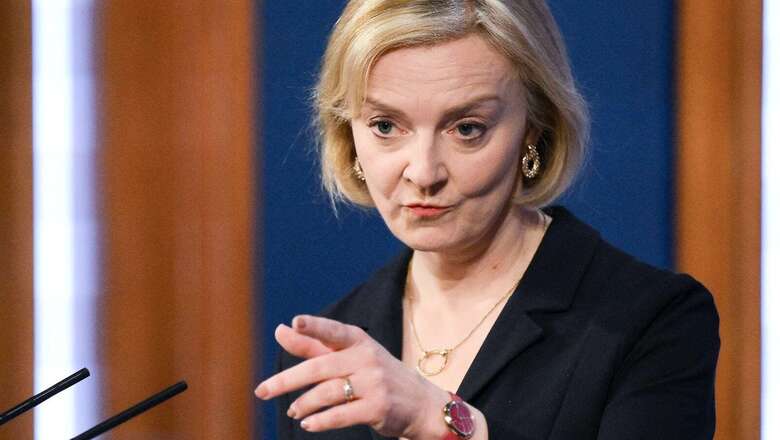
views
Her supporters hailed her as the “New Iron Lady” but Britain’s third female prime minister, Liz Truss, could not live up to her idol Margaret Thatcher’s legacy, as she resigned on Thursday after only six weeks in 10, Downing Street.
From a little bit of a triumph, when she defeated former treasury chief Rishi Sunak to the country’s top job, Truss’ downfall was predicted by many in the run-up to the elections for choosing the leader of Conservative Party after Boris Johnson stepped down.
Critics, and even allies, said her first weeks in office will be turbulent. But, few were prepared for the scale of the sound and fury – least of all Truss herself.
The prime minister’s libertarian economic policies triggered a financial crisis, emergency central bank intervention, multiple U-turns and the firing of her treasury chief and longtime aide Kwasi Karteng. Faced by a mutiny within her own party, the former foreign secretary finally decided to give up rather than cling onto power.
When she took on Sunak earlier, Truss called herself a disruptor out to challenge economic “orthodoxy”. The sad part is that she went all out on the promises she made, and ended up delivering, as a Conservative lawmaker put it, “one horror story after another”.
Her boosterish vision was criticised and opposed quite openly by rival Sunak, who argued that immediate tax cuts would be reckless amid the economic shockwaves from Covid and Ukraine war. But, Truss won 57% votes of the 1,72,000 Conservative Party members in the September 5 contest.
‘Fireworks, breakneck speed’
Despite coming to power at a time when most leaders would backtrack on their staunch election promises, Truss was doing what she and the allies said she would. Experts said the PM ensured that there were “fireworks” as she attempted to push for economic reform at “absolutely breakneck speed”. The scale of it, however, took many by surprise.
“Many of us, wrongly, expected her to pivot after she won the leadership contest in the way many presidents do after winning the primaries,” Tim Bale, professor of politics at Queen Mary University of London, was quoted as saying by The Associated Press.
“But she didn’t do that. She actually meant what she said,” he added.
The results were disastrous. According to a report in AP, the pound plunged to a record low against the US dollar and the cost of government borrowing soared. The Bank of England was forced to step in to buy government bonds and prevent the financial crisis from spreading to the wider economy.
The short shelf life of ‘Trussonomics’
While the Russians called her “a disgrace of a PM”, over the past few weeks British tabloids have mocked Truss by comparing her term as PM to the shelf life of a lettuce. Nothing could salvage the tumultuous situation despite an apology from Truss after she replaced Kwarteng with Jeremy Hunt and sought to reverse all her “mistakes”.
Seeming to change tack, the PM had said mistakes were made but insisted she is going nowhere and will lead the Conservative Party into the next general election. “I recognise we have made mistakes. I am sorry for those mistakes, but I fixed those mistakes,” she said, adding, “I appointed a new chancellor, we have restored economic stability and fiscal discipline. What I now want to do is go on and deliver for the public. We were elected on the 2019 manifesto, and I want to go on and deliver that.”
Hunt, however, was being seen as the de facto chief making all the decisions that had no resemblance to the so-called ‘Trussonomics’, or the tax-cutting vision Truss had campaigned on.
‘Young Margaret Thatcher on speed’
Truss marched in demonstrations against Thatcher as a child, but came to admire the country’s first female leader as an adult. In an old speech, Truss said she would often argue with her “socialist parents in their left-wing household”.
The 47-year-old excited many a hope in her supporters as they saw echoes of the Iron Lady – as Thatcher was known – in Truss’ vision of a “network of liberty” binding democracies around the world.
Born at Oxford in 1975, Truss is the daughter of a math professor and a nurse, who took her on anti-nuclear and anti-Thatcher protests as a child, where she recalled shouting: ‘Maggie, Maggie, Maggie – out, out, out!’
Unlike many of her privately educated Conservative colleagues, Truss attended a public high school when her family moved to Leeds in northern England from Paisley in Scotland. The PM has often spoken about her relatively modest background, evoking comparisons to grocer’s daughter Thatcher. Victoria Honeyman, associate professor of British politics at the University of Leeds, calls her the “the working-class girl done good” in a report published by AP.
She studied philosophy, politics and economics at Oxford University, and was president of the university branch of the Liberal Democratic Party. The economically centrist Lib Dems back constitutional reform and civil liberties, and Truss was an enthusiastic member, putting up ‘Free the Weed’ posters that called for decriminalisation of marijuana and arguing in a speech for the abolition of the monarchy.
It is then, ironic, that Truss’ brush with the monarchy was one of Queen Elizabeth II’s final acts before her death on September 8, and that the PM’s first days in office were overshadowed by a period of national mourning for the queen.
Those who knew her in university and many who have worked with her have called her “headstrong and determined and outspoken”, as well as energetic and “mind-bogglingly ambitious”, comparing her “a young Margaret Thatcher on speed”.
She joined the Conservative Party after Oxford and even worked as an economist for energy company Shell and telecommunications firm Cable and Wireless, and for a right-of-centre think tank while becoming involved in Conservative politics and espousing free market Thatcherite views.
Local councillor, PM, Boris backer
She has served as a local councillor in London and ran unsuccessfully for Parliament twice before being elected to represent the eastern England seat of Southwest Norfolk in 2010. A mother to two teenage daughters and wife to Hugh O’Leary, an accountant, Truss got her first cabinet job as food and environment secretary in 2014.
In the 2016 European Union referendum, she backed the losing “remain” side though she says she was always a natural euroskeptic. She became justice secretary, but was demoted to a more junior role in the treasury by Britain’s second woman PM, Theresa May, in 2017. May, too, was toppled by her repeated failure to break a political deadlock over Brexit.
Truss was an early backer of Johnson to replace her. When he won, Johnson made Truss trade secretary and, in September 2021, was appointed foreign secretary, Britain’s top diplomat.
(With agency inputs)
Read the Latest News and Breaking News here




















Comments
0 comment